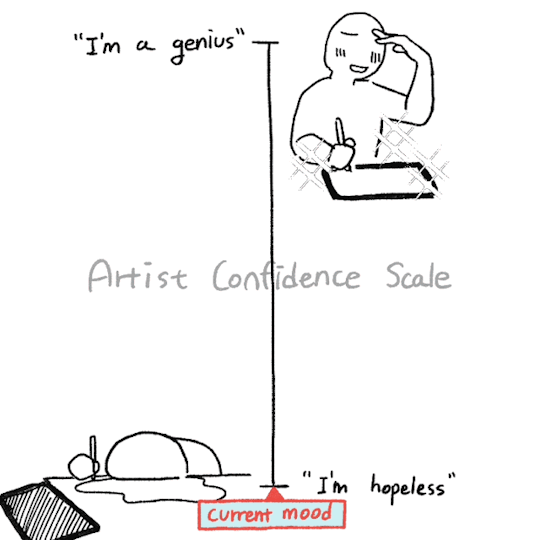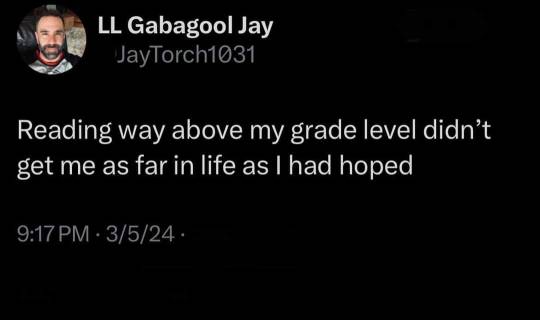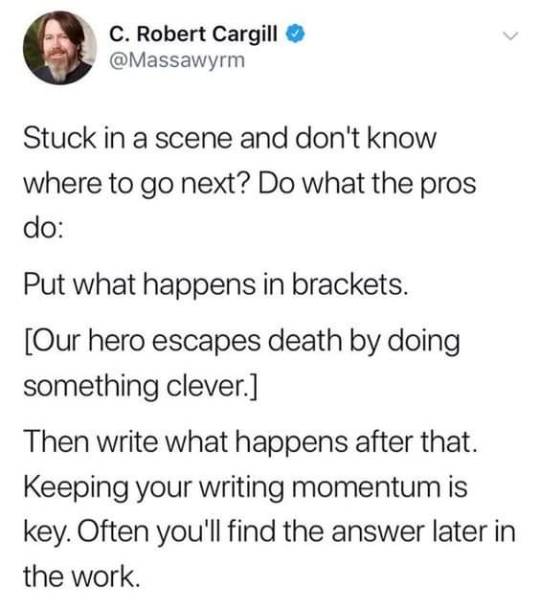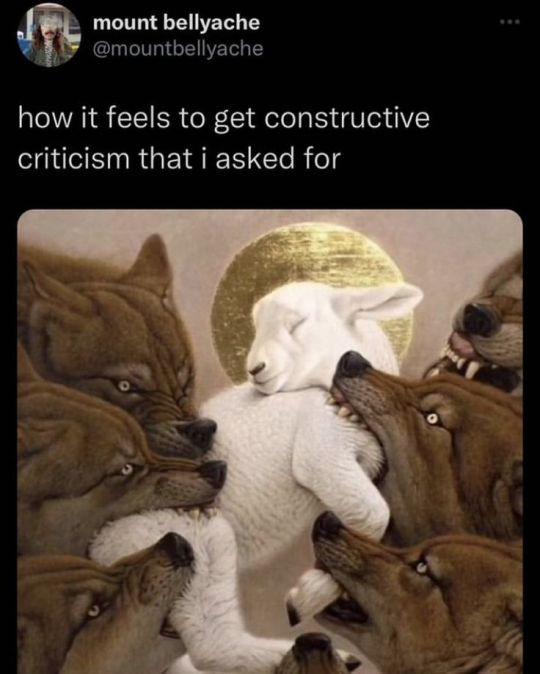Text
how to write creepy stories
over describe things
under describe things
short sentences in rapid succession build tension
single sentence paragraphs build dread
uncanny valley = things that aren't normal almost getting it right
third person limited view
limited expressions
rot, mold, damage, age, static, flickering, espsecially in places it shouldn't be
limited sights for your mc - blindness, darkness, fog
being alone - the more people there are, the less scary it is
intimate knowledge, but only on one side
your reader's imagination will scare them more than anything you could ever write. you don't have to offer a perfectly concrete explanation for everything at the end. in fact, doing so may detract from your story.
5K notes
·
View notes
Text
Things that work in fiction but not real life
torture getting reliable information out of people
knocking someone out to harmlessly incapacitate them for like an hour
jumping into water from staggering heights and surviving the fall completely intact
calling the police to deescalate a situation
rafting your way off a desert island
correctly profiling total strangers based on vibes
effectively operating every computer by typing and nothing else
ripping an IV out of your arm without consequences
heterosexual cowboy
91K notes
·
View notes
Text
idk who needs to hear this but when your english teacher asks you to explain why an author chose to use a specific metaphor or literary device, it’s not because you won’t be able to function in real-world society without the essential knowledge of gatsby’s green light or whatever, it’s because that process develops your abilities to parse a text for meaning and fill in gaps in information by yourself, and if you’re wondering what happens when you DON’T develop an adult level of reading comprehension, look no further than the dizzying array of examples right here on tumblr dot com
199K notes
·
View notes
Text
there's only one thing worse than an awful book, and that is an awful book with ONE tantalisingly compelling element
45K notes
·
View notes
Text
the concept of “plot armor” has done irreparable damage to media analysis and literacy. “oh the only reason this character didn’t die is because they need to be alive later in the story” you don’t fucking say.
42K notes
·
View notes
Text
A Word of Advice About Critique Groups, Beta Readers, and Other Peer-Based Feedback on Your Writing
In my time as a professional editor, I've have many writers come to me with stories they've been trying to improve based on suggestions from critique groups, beta readers, or other non-professional feedback sources (friends, family, etc.). The writers are often frustrated because they don't agree with the feedback, they can't make sense of the comments they've gotten, or they've tried their best to implement the suggestions but now they've made a big mess of things and don't know where to go from here.
If this happens to you, you're not alone. Here's the deal.
Readers and beginning writers are great at sniffing out problems, but they can be terrible at recommending solutions. For that reason, critique groups can be a disastrous place for beginning writers to get advice.
Here's a good metaphor. Imagine you don’t know the first thing about cars. Someone tells you, “There’s oil leaking onto the driveway. You should cover the car with a giant garbage bag.” Alarmed, you oblige, only to be told the next day that “now the car smells like burning plastic and I can’t see out the windows.”
A mechanic would’ve listened to the critic’s complaint and come up with their own solution to the leaking oil, ignoring the amateur’s ridiculous idea, because they know how to fix cars and can use their skills to investigate symptoms and find the correct solution.
Critique groups actually aren’t bad places for experienced writers, because they can listen to the criticism, interpret it, and come up with their own remedies to the problems readers are complaining about. Beginning writers, on the other hand, can end up digging themselves into a deeper hole.
There's a great Neil Gaiman quote about this very conundrum:
Remember: when people tell you something’s wrong or doesn’t work for them, they are almost always right. When they tell you exactly what they think is wrong and how to fix it, they are almost always wrong.
So what to do?
First, try to investigate the reader's complaint and come up with your own solution, instead of taking their solution to the problem. Sometimes, in the end, the reader's solution was exactly right, which is lovely, but don't count on it. Do your own detective work.
Second, take everything you hear with a huge grain of salt, and run the numbers. Are 9 out of 10 readers complaining about your rushed ending? It's probably worth investigating. Does nobody have an issue with your abrasive antagonist except your cozy mystery-loving uncle? Then you might not need to worry about it.
Third, give everything you hear a gut check. Does the criticism, while painful, ring true? Or does it seem really off-base to you? Let the feedback sit for a week or so while you chill out. You might find you're less sensitive and open to what's been said after a little more time has passed.
Lastly, consider getting professional feedback on your writing. Part of my job as an editor is to listen to previous feedback the writer has gotten, figure out whether the readers were tracking the scent of legitimate problems, and offer the writer more coherent solutions. Of course, some professional editors aren't very good at this, just like some non-professional readers are amazing at it, so hiring someone isn't a guarantee. But editors usually have more experience taking a look under the hood and giving writers sound mechanical advice about their work, rather than spouting ideas off the top of their head that only add to the writer's confusion.
Hope this helps!
1K notes
·
View notes
Text
I’m not sure exactly how to articulate it but—there is this bizarre base assumption i see from people discoursing about children’s media, and that’s the assumption that children are somehow unfamiliar with negative emotions. Like, maybe you’ve managed to completely forget your entire life before you turned eighteen, but kids spend a lot of time being hurt, and scared, and angry. A lot of people had terrible fucking childhoods, and a lot of kids are having terrible fucking childhoods right now. When i was a child, and i read books where bad things happened to kids, that was in no way shocking to me, i already knew bad things happened to children. It made me feel more connected to those stories, not less, and it made it more impactful when those child characters overcame it all in the end. That’s important for children. A lot of them are in desperate need of a little hope, and they aren’t going to get it from nothing stories with no conflict. They put conflict in children’s media for a reason
Also i see some of you handwringing over child protagonists going through, like, the most basic hero’s journey. Please, for the love of god, realize that you as an adult are going to understand children’s media differently than the actual kids it’s intended for. Because you’re all grown up now, you aren’t going to be able to relate to a child protagonist. You’re going to see a child in danger. The children the story is meant for are going to see a kid like them who is able to face hardship and triumph
16K notes
·
View notes
Text
unfortunately a lot of the corny self help advice turns out to be true but the thing is you have to come to those conclusions yourself otherwise it just sounds dismissive and dumb
57K notes
·
View notes
Text
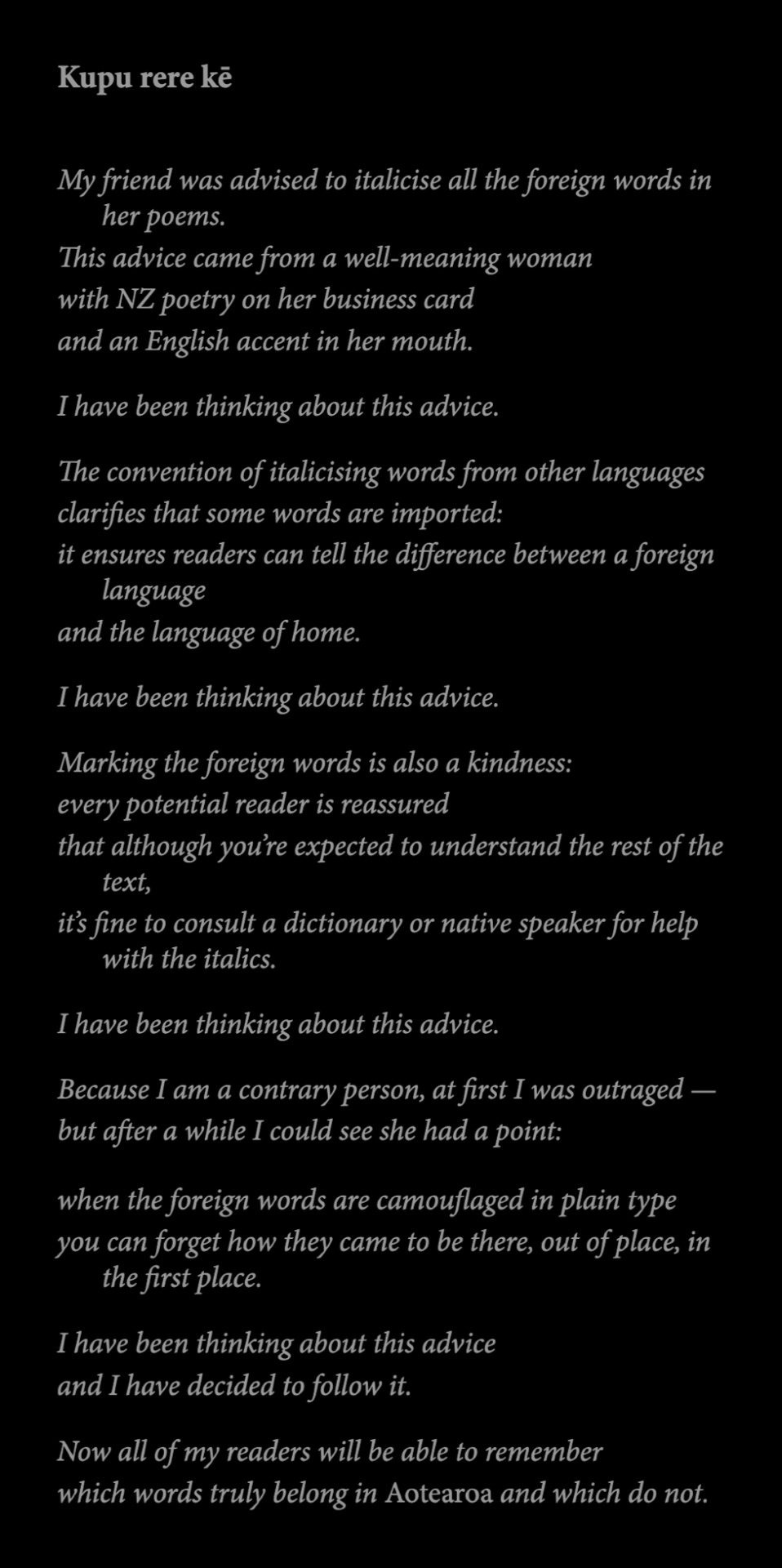
Alice Te Punga Somerville, Always Italicise: How to Write While Colonised - Kupu rere kē

76K notes
·
View notes
Photo

This is the English word I want to get tattooed on my wrist. It means “to keep breathing even though the water rises all around you.” English is such a mystical exotic language. They can fit so much meaning into so small a word.
169K notes
·
View notes
Photo

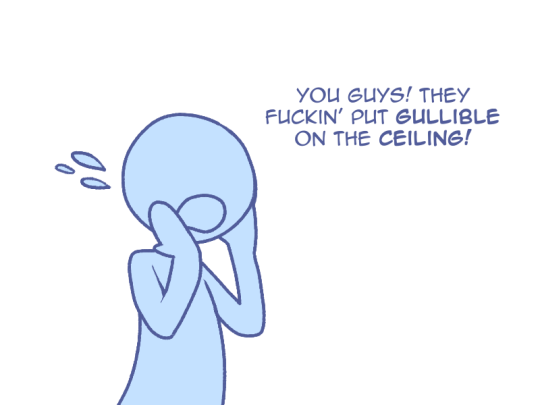


a story about tumblr’s collective ability to fact check
432K notes
·
View notes
Text
If you see beauty in something, don't wait for others to agree.
Sherihan Gamal
5K notes
·
View notes
